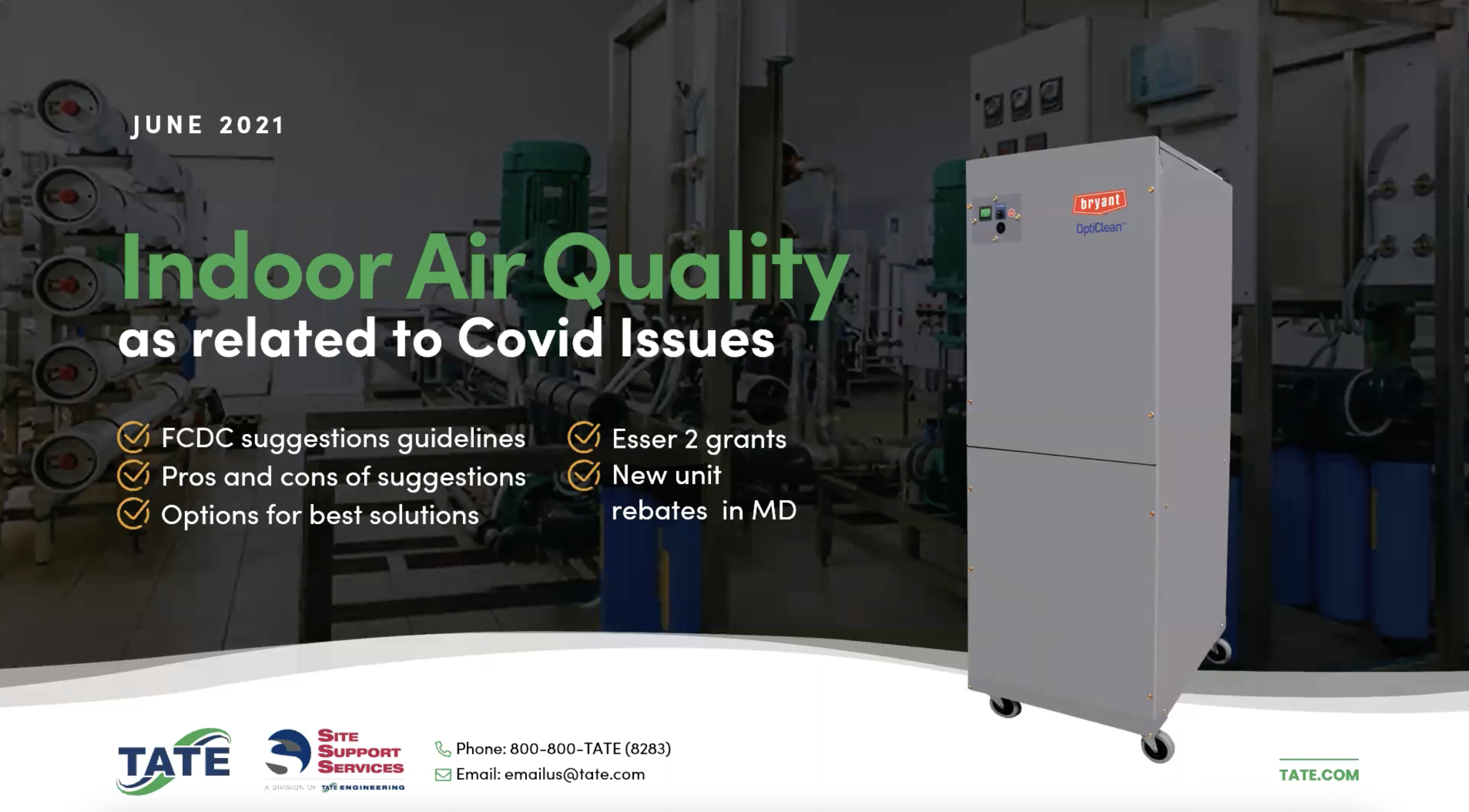
For more than a year, it seems like the world has been shut down. COVID-19 made an impact on every industry, and those of us in charge of building maintenance, particularly in commercial buildings, found ourselves suddenly dealing with a lot less foot traffic. But now the world is opening back up, and people are returning to offices, stores, and other places that felt deserted for a long time. They’re going to be worried about their health and the safety of the air in their workplace.
Related: Why IAQ Is Important When Returning to Work
IAQ and COVID
During our recent live webinar, Tate’s experts, including the team at Site Support Services, talked about IAQ (Indoor Air Quality) and topics that should be addressed to help address IAQ concerns related to COVID. These included:
- Ventilation
- Filtration
- Zoning
- Irradiation
- Humidification
Ventilation
Increasing ventilation, and thus the percentage of outdoor air coming into your building, can be helpful when addressing COVID-19 concerns. Remember, the more air coming in, the more air going out. Consider turning up the use of HVAC systems to keep air moving, and know that if your HVAC unit isn’t capable of the necessary output, it may be necessary to upsize or add new units to your facility. Also recognize that this will cause a greater strain on your air filters and overall HVAC system, particularly with the outside environment having extreme temperature and humidity levels. Consider running ventilation systems even while the building is unoccupied to keep it running at a good pace, rather than starting and stopping.Filtration
Another thing you can do to assuage concerns is ensure that you have the best possible air filters. While some air filters may go too far and restrict airflow, it’s recommended to use MERV 13 or 14 (Minimum Efficiency Reporting Value) air filters and inspect the filter housing to ensure they are clean. Check the equipment itself too, to ensure that the blower motor is in good condition, and do pre- and post-air measurements to ensure that you’re getting the necessary airflow with the filter in place.Related: Do You Know How to Clean Air Filters?
You can also consider mobile air filter units to bring into offices or other areas where you temporarily need air to be filtered and cleaned. Tate can help with providing portable air filtration units to help with things like office meetings or short term in-office work (and these units can also be used for classrooms, if you’re working on school buildings).
Zoning
Consider this the ”social distancing” component of what you can do to prepare your facility. Map out the area you need to maintain air quality for and strategically position air diffusers and dampers, as well as the air flow (including supply and exhaust). In addition, consider where employees and occupants will be, and be mindful of how you can keep safe distances between them and provide ventilation. This method is particularly important for facilities such as schools, stores, and other areas that will see a lot of foot traffic.Irradiation
Research has found that UV light can kill the virus in concentrated amounts. There are modules that can be installed to “irradiate” the air and kill the virus in the airflow, as well as smaller units that can be installed into HVAC units or units that can be installed into air handlers, all of which are provided by our partner company Ultravation. Consider installing these units to help with preventing the virus from spreading (and know that Tate and Ultravation are happy to help with providing and installing the equipment).Related: Ultraviolet for HVAC
Humidification
As the weather gets colder, and humidity in the air drops, it’ll be easier for the virus to survive. Humidifiers can be purchased and installed to provide humidity in a building or space that needs to raise humidity level. However, be sure to recognize that sizing and proper installation preparation will be important, and there will be a need for preventative maintenance in order to ensure that the humidifier continues to function properly.ESSER II Funds and Rebates
As a response to the COVID-19 pandemic, ESSER II funds are provided to help schools combat COVID-related problems, with the intent of paying for preventative measures such as PPE and HVAC maintenance. This funding can be used to maintain and upgrade HVAC and air purification systems, as well as air filters.
Related: ESSER Funding in Your District
In addition, there are opportunities to obtain rebates for investing in high-efficiency equipment for your HVAC systems. While the initial cost would be higher, you would be able to obtain incentives, discounts, and rebates to provide a strong return on your investment by implementing energy efficient equipment (which would also be helpful for the environment).
See for Yourself
Would you like to view the webinar yourself? Just fill out the form on the page linked below and stream it at your convenience. And if we can provide more help after that, just get in touch any time - our experts are here to help, 24/7.
